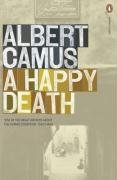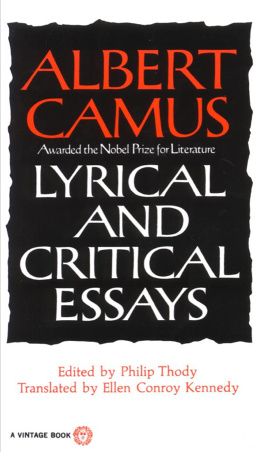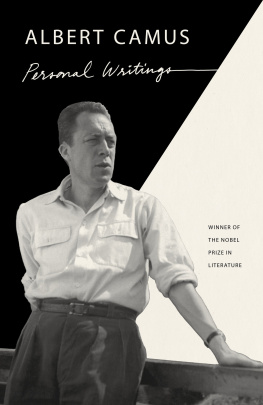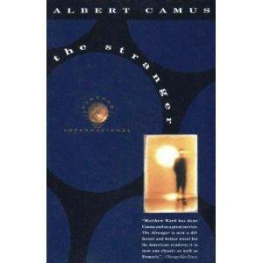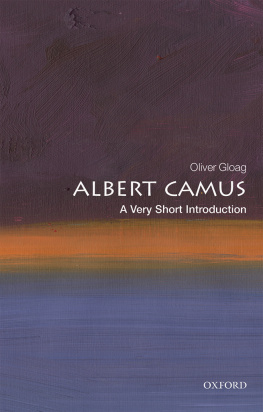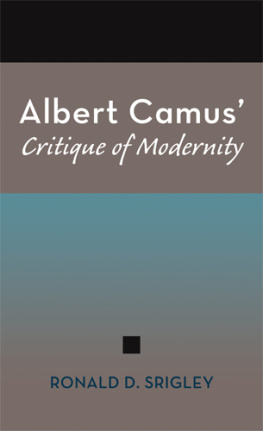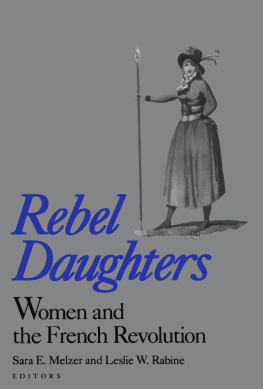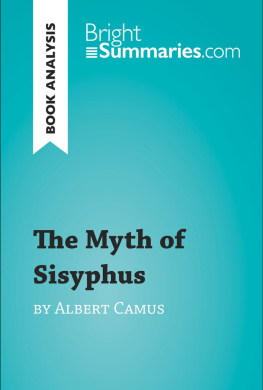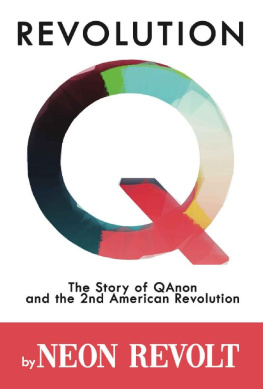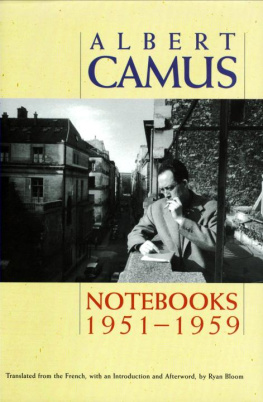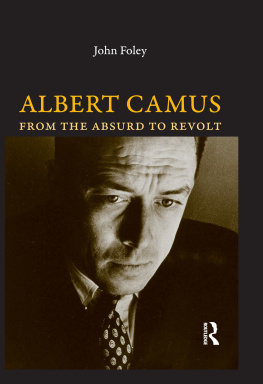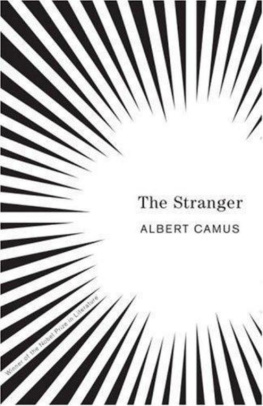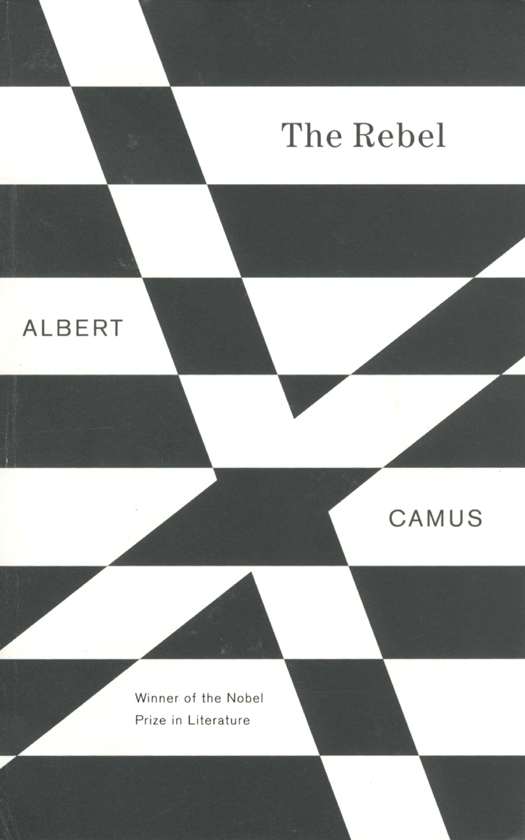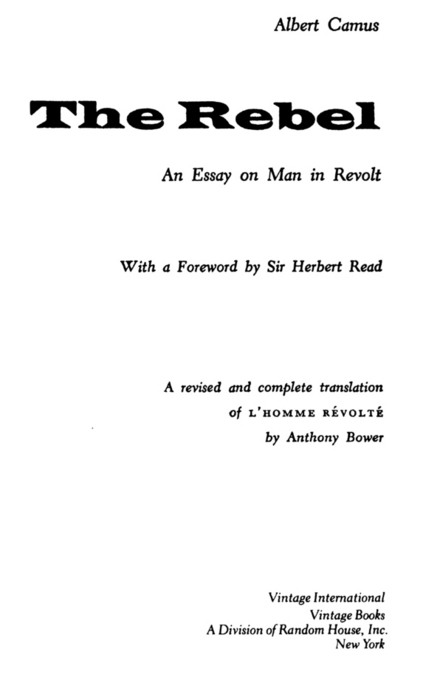
FIRST VINTAGE INTERNATIONAL EDITION, NOVEMBER 1991
Copyright 1956 by Alfred A. Knopf, Inc.
Copyright renewed 1984 by Alfred A. Knopf, Inc.
All rights reserved under International and Pan-American Copyright Conventions. Published in the United States by Vintage Books, a division of Random House, Inc., New York, and simultaneously in Canada by Random House of Canada Limited, Toronto. Originally published in France as Lhomme Rvolt by Librairie Gallimard in 1951. Copyright 1951 by Librairie Gallimard. This translation first published in the United States by Alfred A. Knopf, Inc., New York, in 1956.
Library of Congress Cataloging-in-Publication Data
Camus, Albert, 19131960.
[Homme rvolt. English]
The rebel: an essay on man in revolt / Albert Camus: with a foreword by Herbert Read; a revised and complete translation of LHomme rvolt by Anthony Bower.1st Vintage International ed.
p. cm.
Translation of: LHomme rvolt.
eISBN: 978-0-307-82783-8
1. Revolutions. I. Title
HM281.C3513 1991
303.64dc20 91-50022
Cover design by Helen Yentus
v3.1
Foreword

With the publication of this book a cloud that has oppressed the European mind for more than a century begins to lift. After an age of anxiety, despair, and nihilism, it seems possible once more to hopeto have confidence again in man and in the future. M. Camus has not delivered us by rhetoric, or by any of the arts of persuasion, but by the clarity of his intelligence. His book is a work of logic. Just as an earlier work of his (Le Mythe de Sisyphe) began with a meditation on living or not livingon the implications of the act of suicideso this work begins with a meditation on enduring or not enduringon the implications of the act of rebellion. If we decide to live, it must be because we have decided that our personal existence has some positive value; if we decide to rebel, it must be because we have decided that a human society has some positive value. But in each case the values are not giventhat is the illusionist trick played by religion or by philosophy. They have to be deduced from the conditions of living, and are to be accepted along with the suffering entailed by the limits of the possible. Social values are rules of conduct implicit in a tragic fate; and they offer a hope of creation.
The Rebel, that is to say, offers us a philosophy of politics. It is a kind of book that appears only in France, devoted, in a passionate intellectual sense, to the examination of such concepts as liberty and terror. Not that it is a theoretical workon the contrary, it is an examination of the actual situation of Europe today, informed by a precise historical knowledge of the past two centuries of its social development. It is an attempt to understand the times.
Camus believes that revolt is one of the essential dimensions of mankind. It is useless to deny its historical realityrather we must seek in it a principle of existence. But the nature of revolt has changed radically in our times. It is no longer the revolt of the slave against the master, nor even the revolt of the poor against the rich; it is a metaphysical revolt, the revolt of man against the conditions of life, against creation itself. At the same time, it is an aspiration toward clarity and unity of thoughteven, paradoxically, toward order. That, at least, is what it becomes under the intellectual guidance of Camus.
He reviews the history of this metaphysical revolt, beginning with the absolute negation of Sade, glancing at Baudelaire and the dandies, passing on to Stirner, Nietzsche, Lautramont, and the surrealists. His attitude to these prophetic figures is not unsympathetic, and once more it is interesting to observe the influence of Andr Breton on the contemporary mind. Camus then turns to the history of revolt in the political sense, his main object being to draw a clear distinction between rebellion and revolution. Here, and not for the first time, Camuss ideas come close to anarchism, for he recognizes that revolution always implies the establishment of a new government, whereas rebellion is action without planned issueit is spontaneous protestation. Camus reviews the history of the French Revolution, of the regicides and deicides, and shows how inevitably, from Rousseau to Stalin, the course of revolution leads to authoritarian dictatorship. Saint-Just is the precursor of Lenin. Even Bakunin, to whom Camus devotes some extremely interesting pages (pointing out, for example, that he alone of his time, with exceptional profundity, declared war against the idolatry of science)even Bakunin, if we examine the statutes of the Fraternit Internationale (18647) which he drew up, is found insisting on the absolute subordination of the individual to a central committee of action.
All revolutions in modern times, Camus points out, have led to a reinforcement of the power of the State. The strange and terrifying growth of the modern State can be considered as the logical conclusion of inordinate technical and philosophical ambitions, foreign to the true spirit of rebellion, but which nevertheless gave birth to the revolutionary spirit of our time. The prophetic dream of Marx and the over-inspired predictions of Hegel or of Nietzsche ended by conjuring up, after the city of God had been razed to the ground, a rational or irrational State, which in both cases, however, was founded on terror. The counterrevolutions of fascism only serve to reinforce the general argument.
Camus shows the real quality of his thought in his final pages. It would have been easy, on the facts marshaled in this book, to have retreated into despair or inaction. Camus substitutes the idea of limits. We now know, at the end of this long inquiry into rebellion and nihilism, that rebellion with no other limits but historical expediency signifies unlimited slavery. To escape this fate, the revolutionary mind, if it wants to remain alive, must therefore return again to the sources of rebellion and draw its inspiration from the only system of thought which is faithful to its origins: thought that recognizes limits. To illustrate his meaning Camus refers to syndicalism, that movement in politics which is based on the organic unity of the cell, and which is the negation of abstract and bureaucratic centralism. He quotes Tolain: Les tres humains ne smancipent quau sein des groupes naturelshuman beings emancipate themselves only on the basis of natural groups. The commune against the State deliberate freedom against rational tyranny, finally altruistic individualism against the colonization of the masses, are, then, the contradictions that express once again the endless opposition of moderation to excess which has animated the history of the Occident since the time of the ancient world. This tradition of mesure belongs to the Mediterranean world, and has been destroyed by the excesses of German ideology and of Christian otherworldlinessby the denial of nature.
Restraint is not the contrary of revolt. Revolt carries with it the very idea of restraint, and moderation, born of rebellion, can only live by rebellion. It is a perpetual conflict, continually created and mastered by the intelligence. Whatever we may do, excess will always keep its place in the heart of man, in the place where solitude is found. We all carry within us our places of exile, our crimes and our ravages. But our task is not to unleash them on the world; it is to fight them in ourselves and in others. Rebellion, the secular will not to surrender of which Barrs speaks, is still today at the basis of the struggle. Origin of form, source of real life, it keeps us always erect in the savage, formless movement of history.




